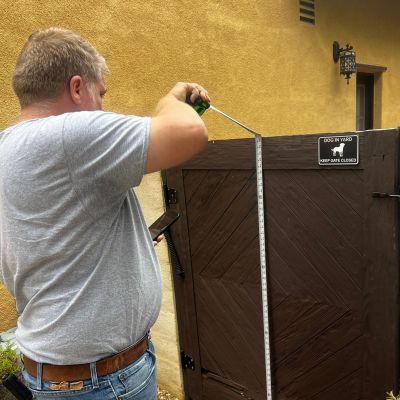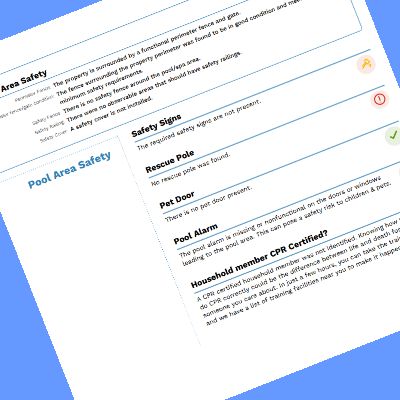

Pool Safety Inspection Services
Pool safety inspection services are designed to evaluate the safety and compliance of swimming pools, ensuring they meet local regulations and provide a secure environment for swimmers. These inspections are essential for homeowners, landlords, property managers, and businesses such as hotels or short-term rentals, as they help identify potential hazards and reduce the risk of accidents or injuries. A professional pool safety inspection provides peace of mind by ensuring the pool area is safe, functional, and up to code.
What a Pool Safety Inspection Includes:
Barrier and Fence Compliance. Inspectors check that pool barriers, fences, and gates meet local safety standards. This includes verifying proper height, secure latches, self-closing mechanisms, and the absence of gaps or climbable surfaces that could allow unauthorized access.
Pool Cover and Alarm Systems. If applicable, pool covers and alarm systems are inspected to ensure they are functioning correctly and meet safety requirements. This is especially important for pools in homes with children or in rental properties.
Deck and Surrounding Area. The pool deck and surrounding areas are examined for hazards such as slippery surfaces, cracks, loose tiles, or uneven ground that could cause trips or falls.
Drain and Suction Safety. Inspectors check that pool drains and suction outlets are compliant with anti-entrapment standards, such as the Virginia Graeme Baker Pool & Spa Safety Act, to prevent accidents caused by suction entrapment.
Water Quality and Visibility. The water is assessed for clarity to ensure swimmers can be seen at all times. Proper chemical balance is also checked to confirm the water is safe and sanitary.
Pool Equipment Functionality. Essential equipment, such as pumps, filters, heaters, and lighting, is inspected to ensure it is in good working order and does not pose any safety risks.
Signage and Safety Equipment. Inspectors verify the presence and condition of required safety equipment, such as life rings, rescue hooks, and first aid kits. They also check for proper signage, including depth mar kers, “No Diving” warnings, and emergency contact information.
Diving Boards and Ladders. Diving boards, slides, ladders, and handrails are inspected for structural integrity and proper installation to ensure they are safe for use.
Benefits of Pool Safety Inspections:
Accident Prevention. Identifies and addresses potential hazards to reduce the risk of injuries or drowning.
Regulatory Compliance. Ensures the pool meets local safety codes and legal requirements, avoiding fines or liability issues.
Peace of Mind. Provides confidence that the pool is safe for family, guests, or renters.
Increased Property Value. A safe and well-maintained pool enhances the overall value and appeal of the property.
Insurance Requirements. Many insurance providers require safety inspections to maintain coverage or reduce premiums.
Pool safety inspections are a proactive way to ensure a safe swimming environment while protecting property owners from liability. Whether for private use or public access, these inspections are a critical step in maintaining a secure and enjoyable pool area.